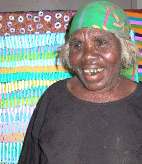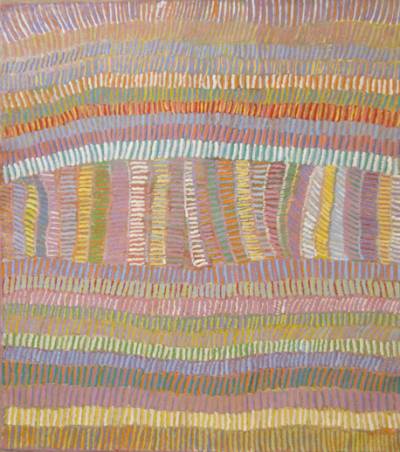EUNICE NAPANANGKA JACK
Deep Water Rockholes at Tjukurla
IKP96EJ19
Acrylic on Paper
56 x 76cm | 22.05 x 29.92in
Ikuntji Artists
ENQUIRE
EUNICE NAPANANGKA JACK
Tali Tali
IKP96EJ22
Acrylic on Paper
56 x 76.5cm | 22.05 x 30.12in
Ikuntji Artists
ENQUIRE
EUNICE NAPANANGKA JACK
Deep Water Rockholes at Tjukurla
IKP96EJ15
Acrylic on Paper
56 x 76.5cm | 22.05 x 30.12in
Ikuntji Artists
ENQUIRE
EUNICE NAPANANGKA JACK
Tali Tali at Kuruldu
IKP96EJ39
Acrylic on Paper
51 x 71cm | 20.08 x 27.95in
Ikuntji Artists
ENQUIRE
Eunice was born in 1940 at Lupul in the Fredrick Range.
When Eunice was a little girl, and like so many other aboriginal families at the time, shortages of food forced her family east towards the ration stations being set up in central Australia. Now an important woman in the community, Eunice is well known for her hunting skills, dancing and traditional law knowledge.
Eunice started painting with the opening of the Ikuntji Women's Centre in August of 1992.
Prior to that during the 1970's she assisted her husband Gideon Tjupurrula Jack who was painting at Papunya Tula. Eunice paintings are interpretations of her country near Lake Mackay.
She uses layers of colour to build up a vision of the bush flowers and grasses.
Amongst this landscape Eunice's personal stories are told, either of the travellings of her tjukurrpa - the Bilby - or the people who once lived in the area.
Her father was Tutuma Tjapangarti, one of the first men to paint for Papunya Tula.
Eunice also paints his country, which includes Tjukurla, Tjila, Kurulto and Lupul. Her mother was from the Walpiri side of Lake Mackay - Winparrku - in Western Australia.
A brilliant colourist, Eunice's Hairstring, Tali (sandhill), Mungada (apple) and wildflower paintings display great talent and dedication to her profession and traditions.
Her Hairstring works are made up of thousands of varied colour strokes, representing the hair being rolled on women's thighs to make bags and clothing.
Her Mungada (apple) works hold myriad dusted mauve circles overlaying the ground of varied coloured feathered brushwork. Highly collectable, Eunice is represented in leading galleries worldwide..
Eunice was born in 1940 at Lupul in the Fredrick Range.
When Eunice was a little girl, and like so many other aboriginal families at the time, shortages of food forced her family east towards the ration stations being set up in central Australia. Now an important woman in the community, Eunice is well known for her hunting skills, dancing and traditional law knowledge.
Eunice started painting with the opening of the Ikuntji Women's Centre in August of 1992.
Prior to that during the 1970's she assisted her husband Gideon Tjupurrula Jack who was painting at Papunya Tula. Eunice paintings are interpretations of her country near Lake Mackay.
She uses layers of colour to build up a vision of the bush flowers and grasses.
Amongst this landscape Eunice's personal stories are told, either of the travellings of her tjukurrpa - the Bilby - or the people who once lived in the area.
Her father was Tutuma Tjapangarti, one of the first men to paint for Papunya Tula.
Eunice also paints his country, which includes Tjukurla, Tjila, Kurulto and Lupul. Her mother was from the Walpiri side of Lake Mackay - Winparrku - in Western Australia.
A brilliant colourist, Eunice's Hairstring, Tali (sandhill), Mungada (apple) and wildflower paintings display great talent and dedication to her profession and traditions.
Her Hairstring works are made up of thousands of varied colour strokes, representing the hair being rolled on women's thighs to make bags and clothing.
Her Mungada (apple) works hold myriad dusted mauve circles overlaying the ground of varied coloured feathered brushwork. Highly collectable, Eunice is represented in leading galleries worldwide..
![Australian Indigenous (Aboriginal and Torres Strait Islander) artwork by EUNICE NAPANANGKA JACK of Ikuntji Artists. The title is Deep Water Rockholes at Tjukurla. [IKP96EJ19] (Acrylic on Paper)](https://media.redotgallery.com/stockroom/gallery/d/deep-water-rockholes-at-tjukurla-626.jpg)
![Australian Indigenous (Aboriginal and Torres Strait Islander) artwork by EUNICE NAPANANGKA JACK of Ikuntji Artists. The title is Tali Tali. [IKP96EJ22] (Acrylic on Paper)](https://media.redotgallery.com/stockroom/gallery/t/tali-tali-627.jpg)
![Australian Indigenous (Aboriginal and Torres Strait Islander) artwork by EUNICE NAPANANGKA JACK of Ikuntji Artists. The title is Deep Water Rockholes at Tjukurla. [IKP96EJ15] (Acrylic on Paper)](https://media.redotgallery.com/stockroom/gallery/d/deep-water-rockholes-at-tjukurla-629.jpg)
![Australian Indigenous (Aboriginal and Torres Strait Islander) artwork by EUNICE NAPANANGKA JACK of Ikuntji Artists. The title is Tali Tali at Kuruldu. [IKP96EJ39] (Acrylic on Paper)](https://media.redotgallery.com/stockroom/gallery/t/tali-tali-at-kuruldu-628.jpg)

